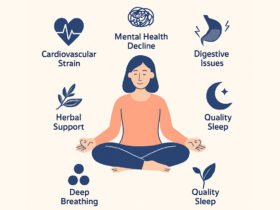Introduction
What if your gut was doing more than just digesting food? Emerging science reveals a powerful connection between your digestive system and your mental well-being. This link, known as the gut-brain axis, highlights how gut health can influence mood, anxiety, depression, and even cognitive function.
Understanding this connection is essential if you want to improve not just physical health—but emotional balance and mental clarity too.
The Gut-Brain Axis Explained
The gut-brain axis is the two-way communication system between your gastrointestinal tract and your central nervous system. This communication happens via:
-
Vagus nerve (direct neural link)
-
Hormones and neurotransmitters
-
Immune system signals
-
Gut microbiota (the trillions of microbes in your digestive tract)
When your gut is healthy, these signals support a balanced mood and clear thinking. But when your gut is out of balance, it can contribute to mental health issues.
How Gut Health Impacts Mental Health
1. Gut Microbiome and Mood Regulation
Your gut bacteria produce neurotransmitters like serotonin, dopamine, and GABA—all critical for mood stability. In fact, up to 90% of serotonin is produced in the gut. An unhealthy microbiome can reduce these chemicals, leading to anxiety and depression.
2. Inflammation and the Brain
Poor gut health can trigger chronic low-grade inflammation. These inflammatory signals can cross into the brain, disrupting normal brain function and potentially contributing to conditions like depression or brain fog.
3. Stress and Gut Health
Mental stress impacts the gut directly—causing bloating, discomfort, and changes in digestion. At the same time, an imbalanced gut can increase the body’s stress response. It’s a vicious cycle unless properly addressed.
4. Leaky Gut and Mental Clarity
A compromised gut lining (also known as “leaky gut”) allows toxins to enter the bloodstream, which can negatively affect cognitive function, mood, and memory.
Tips to Support Gut and Mental Health Together
1. Eat More Fermented Foods
Include yogurt, kefir, kimchi, sauerkraut, miso, and kombucha. These foods support a diverse and healthy gut microbiome.
2. Add Prebiotic Fiber
Prebiotics like garlic, onions, bananas, oats, and apples feed the good bacteria in your gut—helping them thrive and improve mood regulation.
3. Reduce Processed Foods and Sugar
A high-sugar, low-fiber diet can promote bad bacteria and increase inflammation, negatively impacting your brain function and mood.
4. Manage Stress Levels
Practice mindfulness, yoga, or deep breathing to reduce stress and its harmful effects on the gut-brain axis.
5. Get Quality Sleep
Poor sleep affects both mental and digestive health. Aim for 7–9 hours of restorative sleep each night.
6. Stay Active
Regular movement boosts both gut motility and mood-enhancing brain chemicals like endorphins and serotonin.
Conclusion
Your mental health is deeply connected to your gut. When your digestive system is healthy, your mood, clarity, and emotional resilience improve too. By nourishing your gut with the right foods and lifestyle habits, you can support a balanced mind and a stronger sense of overall wellbeing.











Leave a Reply